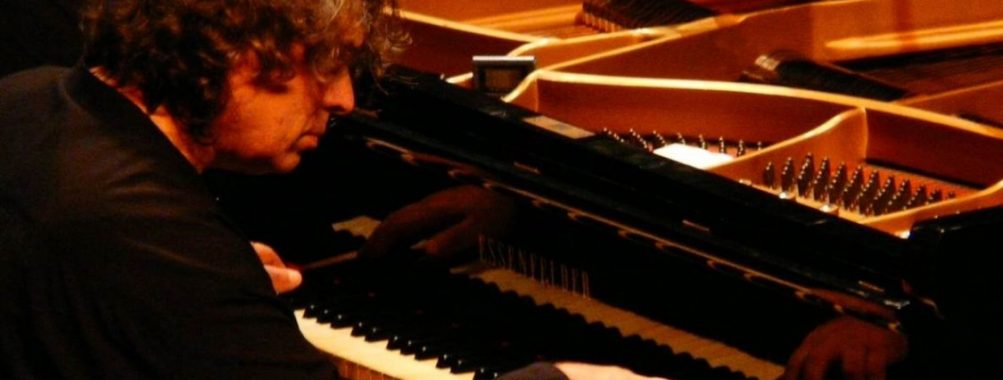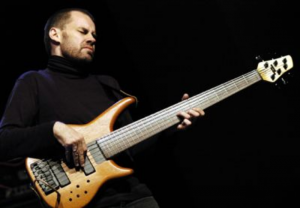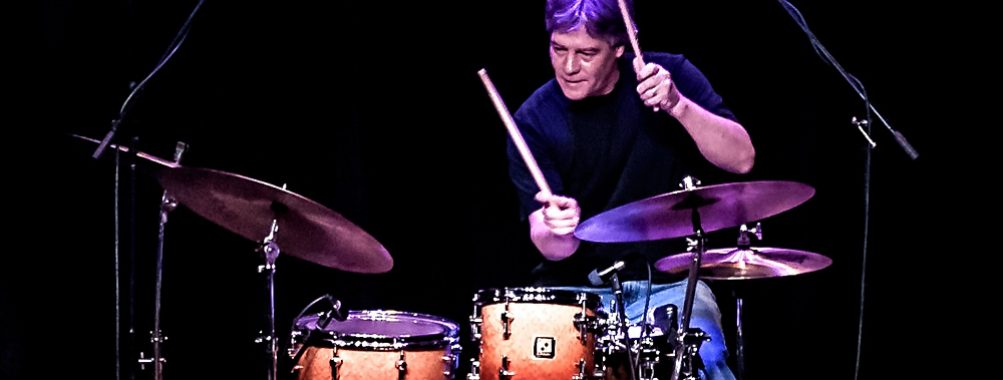
Stu Goldberg- Insights into Inner Worlds by Walter Kolosky
Keyboardist Stu Goldberg is one of the rare players to have appeared with guitarist John McLaughlin in three different bands. In 1974, as a 19-year-old, he was in McLaughlin’s third incarnation of the Mahavishnu Orchestra. He was a foundation piece of McLaughlin’s One Truth.
Band that also featured violinist L. Shankar. Finally he was in a promising, but short-lived, band that featured McLaughlin, Jack Bruce and Billy Cobham that toured Europe only to have the unfortunate experience of being ripped-off by an unscrupulous promoter that Goldberg says manipulated the players against each other.
Goldberg hasn’t toured since 1984, opting instead to settle down, raise a family and go into the music production business. Over the years he has performed and / or scored hundreds of film and TV projects. Currently, from his professional studio in British Columbia, he scores and records the music for the hit show The Amazing Race. Stu also continues to record and produce his own jazz records as well as those for others on the Dedication label, which he owns.
In the fusion world, Goldberg will always be remembered for his blistering early synthesizer work. Goldberg started playing the early synthesizers in the 1960’s before they had any melodic capabilities at all. So it was natural that he was able to grow with the instrument and be one of its main proponents in the fusion movement. Eventually, however, its limitations sent him back to playing acoustic piano only. After being away from the technology for quite some time, Goldberg returned to it in the 1980’s as its voice had become much more expressive through years of product development.
Among many topics discussed with Abstract Logix, Goldberg expounded a bit on what it was like being part of the Mahavishnu Orchestra and in particular provided some insight into the enigmatic “Inner Worlds” album.
This album, released in 1975, has provided fodder for fusion and McLaughlin fans’ arguments for many years. Some fans love the album to death, citing it as one of the great fusion and progressive records ever. Others were turned off by what they perceived as ugly screeches and a seeming lack of focus. The album featured the early use of a guitar synthesizer, along with Goldberg’s keyboard arsenal, but also featured a great deal of near-pop vocal work which had been mostly absent from the previous incarnations of the band.
SG: I get a call from John McLaughlin’s manager who tells me to pack my bags because they have a ticket for me to New York to join and rehearse with the new McLaughlin band and that we are going on tour with Jeff Beck! Just like that! I packed my stuff, took a couple of my synthesizers. I’ll never forget it. I arrived in New York and went right to the rehearsal hall. McLaughlin, Michael Walden and Ralphe Armstrong were there. We just started playing. (Editor’s note: Although never recorded officially, this band was pared down from the Jean-Luc Ponty version of the Orchestra, but still featured saxophone players Norma Jean Bell and Russell Tubbs and string people Stephen Kindler and Carol Shive). We rehearsed for a couple of weeks and then went on the road for three months with Jeff Beck. (Editor’s note: After the tour, the band was further reduced to the quartet that, after extensive touring, recorded “Inner Worlds”.
AL: Do you have memories of recording that album?
SG: It was a lot of fun. We stayed a month at Le Chateau Herouville. It was outside Paris. Yeah, we stayed there for a whole month. Those were the days of big budgets I guess. In fact, [laughs] I remember it took a whole week to get the drum sound right! [Laughs again] I’ve never seen anything like it.
AL: “Inner Worlds” is a very interesting album. There are some things on it that are absolutely wonderful. There are other things on it that some fans have found uneven. But giving it a listen today, I would say that you could look at those tunes and find a highly experimental album.
SG: It was really experimental! John, is in a way, kind of like Miles in the sense that he really relates to drummers. When we used to do our live shows, he would have this mind lock with Narada Michael Walden. He used to do that with Billy (Cobham). Invariably they would do a half-hour duet at every show. There is a track on “Inner Worlds”, that doesn’t last a half hour, but features Michael and John with his ring-modulator. This sound was really experimental and stretched the boundaries at the time, sort of like Coltrane and Elvin Jones had done in their time. It was out there.
AL: In the past, I have always had a problem with McLaughlin’s use of that Ring-Modulator. I think in recent years, say with the Heart of Things, he seems to have found a voice that at least I can identify with and like.
SG: I think it was just a way to get that primal cry. A primal scream. You know, the way Coltrane did with the multiphonics and the way he would overmodulate the saxophone and get those harmonics. There is only so much you can do with feedback on a guitar. It was like he was taking the destruction of the waveform one step further.
AL: It is really about taking a risk. Isn’t it? It is to be admired.
SG: Yes it is.
AL: Nowadays on your jazz albums you play something you call post fusion. What exactly is that?
SG: Post-fusion?…. [Laughs]…I was trying to figure out what to call the music I have been putting out with my jazz albums. I had to categorize them somehow so that people would know whether they wanted to listen to them or not. I needed a way to describe it. Fusion was the loud, fast, electric music of the seventies- what I was doing with McLaughlin. Post-fusion is really about coming back and playing the type of music that existed prior to the seventies using acoustic instruments, but with the sensibilities of someone who has been through that music.
Visit Stu Goldberg on the web at stugoldberg.com
Latest album
Latest NEWS
SUBSCRIBE
Please Subscribe your mail to get notification from AbstractLogix.
Facebook-f
Twitter
Instagram
Youtube
Copyright © 2021 ABSTRACT LOGIX
Facebook-f
Twitter
Instagram
Youtube
Copyright © 2021 ABSTRACT LOGIX

